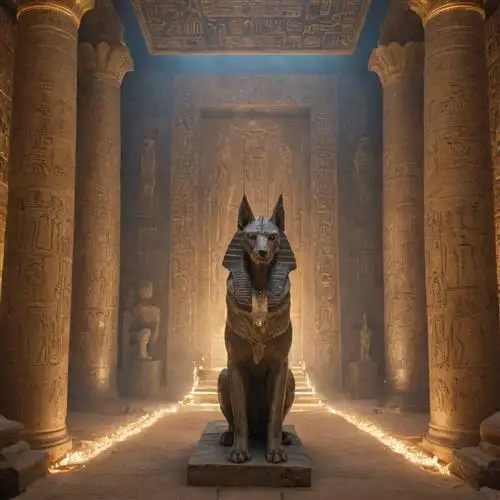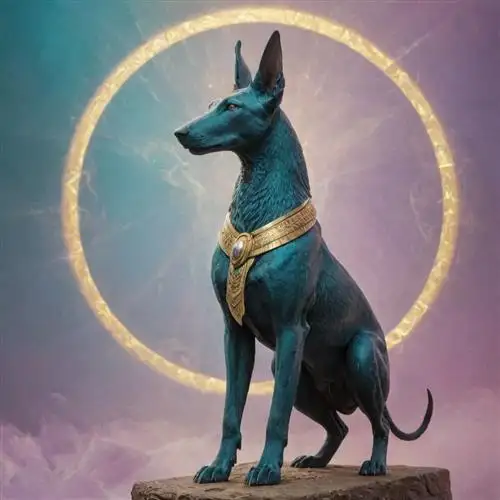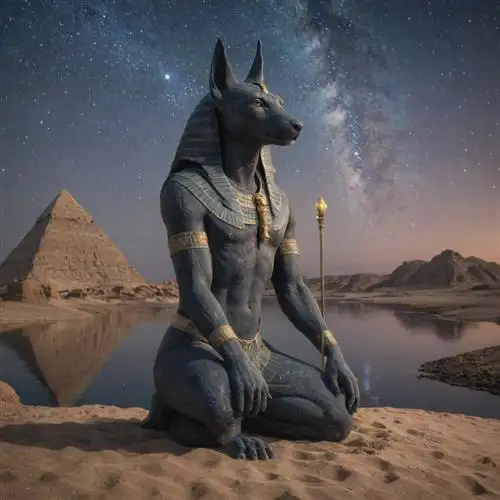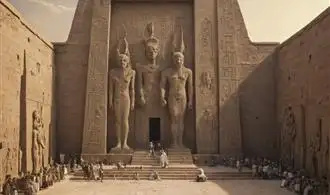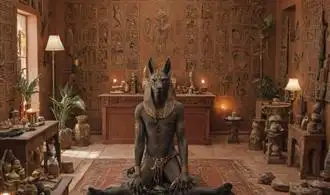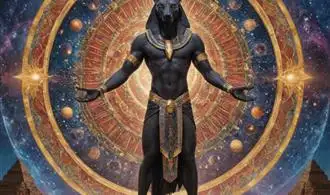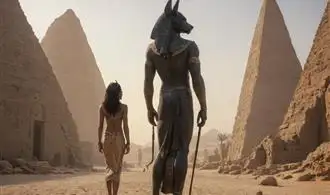
Anubis The Guardian of the Afterlife
Anubis, the Egyptian god of the afterlife, is a powerful figure who can guide you through the fears and uncertainties of mortality. As the guardian of the dead, Anubis plays a crucial role in the transition from this life to the next, ensuring a safe passage for the souls of the deceased. By understanding Anubis's role and the significance of the afterlife in ancient Egyptian beliefs, you can find comfort and a sense of purpose in facing your own mortality.
In the ancient Egyptian pantheon, Anubis was responsible for the mummification process, guiding the dead through the dangerous journey to the afterlife. He was also tasked with weighing the hearts of the deceased against the feather of Ma'at, the goddess of truth and justice. This ritual, known as the "Weighing of the Heart," determined whether the individual was worthy of entering the afterlife or condemned to eternal darkness.
Anubis's role as the guardian of the afterlife can provide a sense of reassurance and security for those who are grappling with the fear of death. By embracing the teachings of Anubis, you can cultivate a deeper understanding of the afterlife and the importance of living a life of integrity and truth. This can help you overcome the anxiety and uncertainty that often accompany the thought of mortality.
Moreover, Anubis's presence in the afterlife can provide a sense of The FOMO with Anubis and the Afterlife, where the fear of missing out on life's experiences is replaced by the peace and tranquility of the afterlife. By trusting in Anubis's guidance, you can let go of the attachments and anxieties that often hold us back in this life and embrace the infinite possibilities of the afterlife.
Mastering the Art of Transformation
At the heart of Anubis' teachings lies the profound concept of transformation. As the ancient Egyptian god of the dead, Anubis serves as a guide, ushering the deceased through the threshold of the afterlife. His role extends far beyond the physical realm, offering a deeper understanding of the transformative power that lies within each individual.
Anubis' domain encompasses the process of death and rebirth, a cyclical journey that mirrors the natural ebb and flow of our own lives. By embracing Anubis' guidance, we can learn to navigate the challenges and uncertainties that often accompany this transformation, ultimately emerging with a greater sense of purpose and a deeper connection to the mysteries of the afterlife.
One of the key aspects of Anubis' teachings is the cultivation of inner strength and resilience. As the guardian of the underworld, Anubis is associated with the ability to confront and overcome fear. Through his guidance, individuals can develop the courage to face their own mortality and the profound changes that accompany it.
By delving into the symbolism and mythology surrounding Anubis, we can uncover powerful insights that can inform our own personal transformation. For instance, the jackal-headed deity is often depicted as a protector, guarding the deceased and ensuring their safe passage to the afterlife. This imagery can serve as a powerful reminder of the importance of self-acceptance, vulnerability, and the willingness to embrace the unknown.
Moreover, Anubis' connection to the process of mummification, a practice believed to preserve the physical form for the journey to the afterlife, offers a metaphorical understanding of the importance of shedding the old to make way for the new. This concept can be applied to various aspects of our lives, encouraging us to let go of limiting beliefs, outgrown habits, and outdated perspectives in order to facilitate personal growth and transformation.
Embracing the Cycle of Life and Death
Anubis, the ancient Egyptian deity associated with the afterlife, offers profound insights into the universal experience of mortality. As the guardian of the dead and the embalmer of the pharaohs, Anubis guides the soul through the transition from life to death, revealing the inherent wisdom in this cyclical journey. By embracing the teachings of Anubis, we can develop a deeper understanding of the natural order of existence and find solace in the certainty of the afterlife.
Anubis reminds us that death is not an end but a necessary transformation. The Egyptian belief in the afterlife emphasizes the continuity of the soul, where the deceased is not merely extinguished but rather enters a new phase of being. Anubis, with his jackal-like head, symbolizes the duality of life and death, guiding the deceased through the gates of the underworld and ensuring their safe passage to the next realm.
The rituals and practices associated with Anubis, such as mummification and the weighing of the heart, demonstrate the reverence with which the ancient Egyptians treated death. These practices were not merely symbolic; they were a means of ensuring the deceased's successful transition and the preservation of their essence. By understanding and honoring these rituals, we can cultivate a sense of respect and acceptance towards the inevitable cycle of existence.
Anubis also reminds us of the importance of self-reflection and personal transformation. The Egyptian concept of the afterlife was not a passive state of being; it was a journey of self-discovery and growth. The deceased were judged based on their actions and the purity of their heart, a testament to the belief that the afterlife was a continuation of one's personal growth and spiritual evolution.
Overcoming the Fear of the Unknown
Anubis, the ancient Egyptian god of the afterlife, is often associated with the profound and complex journey of confronting the unknown. As a guide and protector of the dead, Anubis can offer invaluable insights and wisdom to those grappling with the fear of the unknown, particularly when it comes to the afterlife. By embracing Anubis' teachings, individuals can unlock the path to inner peace, acceptance, and a deeper understanding of the mysteries that lie beyond the veil of mortal existence.
One of the primary ways Anubis can help individuals overcome the fear of the unknown is by fostering a sense of trust and surrender. Anubis is often depicted as a jackal-headed deity, symbolizing his role as a guardian who watches over the transition from life to death. By acknowledging Anubis' presence and seeking his guidance, individuals can cultivate a deeper sense of trust in the natural cycle of existence, allowing them to let go of the need to control the unknown.
Moreover, Anubis' connection to the afterlife can provide a framework for understanding the continuity of consciousness beyond the physical realm. Through meditation, contemplation, and study of Anubis' mythology, individuals can develop a more expansive and compassionate perspective on the nature of the soul and the eternal journey that awaits us all. This understanding can help alleviate the anxiety and uncertainty that often accompany the fear of the unknown, as it offers a reassuring and meaningful perspective on the afterlife.
Anubis is also associated with the importance of rituals and ceremonies in navigating the profound and transformative experience of death. By engaging with the rites and practices associated with Anubis, individuals can find solace, comfort, and a sense of purpose in the face of the unknown. These rituals can serve as powerful tools for processing grief, honoring the departed, and finding meaning in the transition from life to death.
Furthermore, Anubis' role as a psychopomp, or a guide of souls, can provide individuals with a sense of accompaniment and support as they confront the unknown. By invoking Anubis' presence and trusting in his guidance, individuals can feel less alone in their journey, finding strength and courage in the knowledge that they are not facing the unknown entirely on their own.

